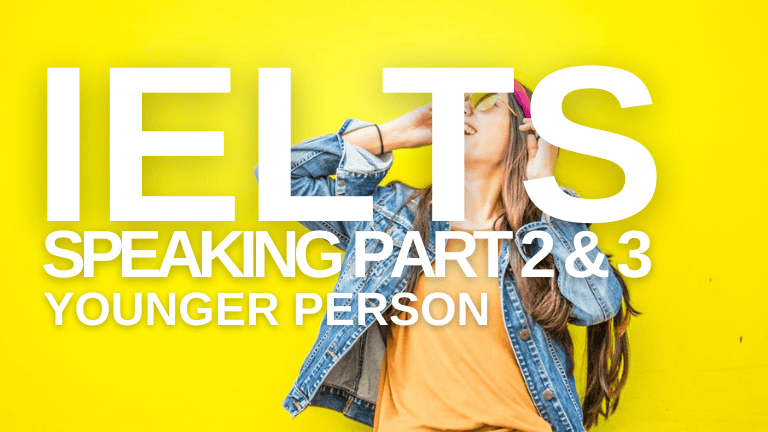
IELTS Speaking Part 2 & 3 – Younger Person
IELTS Speaking Part 2
Describe a time when you showed something new to a younger person.
You should say:
- When it was
- What it was
- Who you showed it to
- How you showed it
- Why you showed it
- And explain how you felt about it.
One memorable time I showed something new to a younger person was about a decade ago when I taught my younger cousin how to change the oil in our car. At that time, I was in my early twenties, and my cousin was just 15 years old. I had been driving and maintaining cars for a few years already, so I thought it would be a great opportunity to share my knowledge with him.
My cousin had always been interested in cars, but he never had anyone to teach him about them because his dad wasn’t around much. I could see his curiosity whenever he saw me working on the car. One weekend, I decided to involve him in the process. I explained to him the importance of changing the oil regularly to keep the engine in good condition and how to check if the oil filter needed replacing.
We started with the basics. First, I showed him how to gather the tools and materials we needed: an oil filter wrench, a drain pan, and new oil. Then, I guided him step-by-step through the process. We jacked up the car, placed the drain pan underneath, and carefully removed the oil drain plug. I explained why it’s crucial to let the old oil drain completely. Next, I showed him how to replace the old oil filter with a new one and tighten it securely. Finally, we added fresh oil to the engine and checked the levels.
I decided to teach him this because I wanted him to gain a useful skill that could save him money and give him confidence. Seeing his enthusiasm and eagerness to learn made me feel proud. I felt like I had passed on something valuable to him, and it strengthened our bond as cousins.
IELTS Speaking Part 3
- Is it possible for a person to achieve something without motivation?
- How can young people be motivated to learn new things?
- What skills do you think children should learn before going to school?
- Why are some people not willing to ask for help from others while studying?
- What are the differences between the things adults learn and the things that children learn?
- What skills should children learn?
1. Is it possible for a person to achieve something without motivation?
It is very hard to achieve something without any form of motivation. In my opinion, motivation is the driving force behind every successful endeavor. Even if it is not the most obvious or intense form of motivation, there is always some underlying reason that pushes someone to succeed. Whether it’s the desire for financial stability, personal growth, or even the satisfaction of proving oneself, these factors serve as motivation. In the absence of motivation, it is difficult to maintain the discipline, effort, and perseverance needed to overcome obstacles. Motivation, no matter how small, is crucial to achieving any goal.
2. How can young people be motivated to learn new things?
There are many ways young people can be motivated to learn new things, but personal interest is the most defining factor. When young people are genuinely interested in a topic, they are more likely to engage with it and develop a deeper understanding. While external factors such as rewards, encouragement, and role models can certainly provide motivation, nothing beats intrinsic motivation. Encouraging curiosity, allowing young people to explore their own passions, and creating an environment where learning is fun and relevant to their lives will lead to a more sustained motivation. In the end, personal interest always triumphs as the most effective motivator.
3. What skills do you think children should learn before going to school?
Before starting school, children should learn basic communication skills. The ability to express their thoughts, feelings, and needs is essential for their academic and social development. Effective communication helps them interact with others and participate in classroom activities. Along with communication, children should also learn basic social skills such as sharing, listening, and working in a group. These skills will help them build positive relationships with their peers and teachers. Learning how to follow simple instructions and manage their emotions are also important skills for young children to develop before school begins.
4. Why are some people not willing to ask for help from others while studying?
Some people are reluctant to ask for help when studying because they have had negative experiences in the past. They may have helped others in the past and never received the same support in return. This can create a sense of mistrust or a belief that asking for help is a one-sided effort. Additionally, some individuals may feel embarrassed or self-conscious about needing help, viewing it as a sign of weakness or incompetence. In a society where people often expect something in return for their assistance, true altruism can be rare, and this may discourage people from seeking help when needed.
5. What are the differences between the things adults learn and the things that children learn?
There are several key differences between what adults and children learn. Adults generally learn more slowly than children because they often have many responsibilities and concerns that occupy their minds. They also tend to have more life experiences and preconceived notions, which can make it harder for them to grasp new ideas quickly. Adults usually learn more complex topics, often related to their careers or personal development. In contrast, children focus on building foundational knowledge and skills, such as learning to read, write, and interact socially. While both groups learn, the content and pace of learning differ greatly due to their life stages.
6. What skills should children learn?
In addition to communication skills, children should learn how to interact with others and negotiate in social situations. These skills are important as they will help children navigate relationships with peers, teachers, and family members. Even at a young age, children can begin to learn how to share, collaborate, and resolve conflicts. Learning these skills at a young age will make it easier for them to adapt to social environments and develop emotional intelligence. It’s also important for children to learn the basics of problem-solving, critical thinking, and decision-making, which will help them become more independent and responsible as they grow older.
Check Educatorian, IELTS Rizz IELTS WE and IELTS101
Check List of question for September to December 2024

Ian Tanpiuco is an ESL and virtual assistant. With a decade of experience, he has become an expert in his field. Dedicated to helping others achieve their goals, Ian works tirelessly in the classroom or as a virtual assistant.

